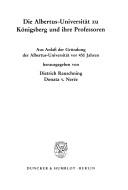| Listing 1 - 7 of 7 |
Sort by
|
Book
ISBN: 3932382072 Year: 1998 Publisher: Bochum : Lotman-Institut,
Abstract | Keywords | Export | Availability | Bookmark
 Loading...
Loading...Choose an application
- Reference Manager
- EndNote
- RefWorks (Direct export to RefWorks)
Book
ISBN: 3932382099 Year: 1999 Publisher: Bochum : Lotman-Institut,
Abstract | Keywords | Export | Availability | Bookmark
 Loading...
Loading...Choose an application
- Reference Manager
- EndNote
- RefWorks (Direct export to RefWorks)

ISBN: 3428085469 Year: 1995 Publisher: Berlin Duncker und Humblot
Abstract | Keywords | Export | Availability | Bookmark
 Loading...
Loading...Choose an application
- Reference Manager
- EndNote
- RefWorks (Direct export to RefWorks)
Book
ISBN: 3772814948 3772814956 Year: 1999 Publisher: Stuttgart Holzboog-Fromann
Abstract | Keywords | Export | Availability | Bookmark
 Loading...
Loading...Choose an application
- Reference Manager
- EndNote
- RefWorks (Direct export to RefWorks)
Book
ISBN: 9781107031104 9781139381239 9781107595347 9781107689824 1107689821 9781107598256 1107598257 1139381237 9781306376198 130637619X 1107031109 1139892304 9781139892308 1107701740 9781107701748 1107666996 9781107666993 1107703743 9781107703742 110770281X 1107595347 Year: 2014 Volume: *42 Publisher: Cambridge New York Cambridge University Press
Abstract | Keywords | Export | Availability | Bookmark
 Loading...
Loading...Choose an application
- Reference Manager
- EndNote
- RefWorks (Direct export to RefWorks)
Making the Soviet Intelligentsia explores the formation of educated elites in Russian and Ukrainian universities during the early Cold War. In the postwar period, universities emerged as training grounds for the military-industrial complex, showcases of Soviet cultural and economic accomplishments and valued tools in international cultural diplomacy. However, these fêted Soviet institutions also generated conflicts about the place of intellectuals and higher learning under socialism. Disruptive party initiatives in higher education - from the xenophobia and anti-Semitic campaigns of late Stalinism to the rewriting of history and the opening of the USSR to the outside world under Khrushchev - encouraged students and professors to interpret their commitments as intellectuals in the Soviet system in varied and sometimes contradictory ways. In the process, the social construct of intelligentsia took on divisive social, political and national meanings for educated society in the postwar Soviet state.
378.4 <47> --- Universiteiten--Rusland. Sovjet-Unie --- 378.4 <47> Universiteiten--Rusland. Sovjet-Unie --- Higher education and state --- Intellectuals --- Universities and colleges --- Education, Higher --- State and higher education --- Education and state --- Colleges --- Degree-granting institutions --- Higher education institutions --- Higher education providers --- Institutions of higher education --- Postsecondary institutions --- Public institutions --- Schools --- History --- Government policy --- Soviet Union --- Intellectual life --- History. --- Arts and Humanities
Book
ISBN: 9789004471771 9004471774 9789004471788 9004471782 Year: 2022 Publisher: Leiden, Netherlands ; Boston, Massachusetts : Brill,
Abstract | Keywords | Export | Availability | Bookmark
 Loading...
Loading...Choose an application
- Reference Manager
- EndNote
- RefWorks (Direct export to RefWorks)
In Cold War in Universities: U.S. and Soviet Cultural Diplomacy, 1945-1990 Natalia Tsvetkova recounts how the United States and the Soviet Union aspired to transform overseas academic institutions according to their political aims during the Cold War. The book depicts how U.S. and Soviet attempts to impose certain values, disciplines, teaching models, structures, statutes, and personnel at universities in divided Germany, Afghanistan, Ethiopia, both Vietnams, and Cuba as well as Guatemala were foiled by sabotage, ignorance, and resistance on the part of the local academic elite, particularly professors. Often at odds with local academic communities, U.S. and Soviet university policies endured unexpected frustrations as their efforts toward Americanization and Sovietization faced developmental setbacks, grassroots resistance, and even political fear.
378.4 <47> --- 378.4 <73> --- Education, Higher --- Higher education and state --- Cultural diplomacy --- Cold War --- Universiteiten--Rusland. Sovjet-Unie --- Universiteiten--Verenigde Staten van Amerika. VSA. USA --- American influences --- History --- Soviet influences --- Commercial policy --- United States --- History.
Book
ISBN: 0520057600 0585116695 Year: 1989 Volume: 5 Publisher: Berkeley Los Angeles London University of California Press
Abstract | Keywords | Export | Availability | Bookmark
 Loading...
Loading...Choose an application
- Reference Manager
- EndNote
- RefWorks (Direct export to RefWorks)
Annotation Between 1899 and 1911, student strikes and demonstrations disrupted Russia's higher educational institutions. The universities marched to their own peculiar tempo, however, and it was not until the strike of 1905 that student unrest coincided with mass movements outside the academic world.Students, Professors, and the State in Tsarist Russia, the first comprehensive study of the student movement during the waning decades of tsarist rule, centers on the interplay among student protest, faculty politics, and government policy toward the universities. The author examines the changing responses of students, faculty, and government officials to the crisis of the university and the old regime, throwing new light on the chronic political and social instability of the tsarist system. Kassow's familiarity with source material and his use of narratives from participants and observers alike provide both a trenchant analysis and a lively portrait of the times. Original and incisive, this book will be welcomed not only by specialists in the Russian field, but also by anyone interested in the dynamics of student protest and the role of the intellectual in popular movements
Student movements --- College teachers --- Higher education and state --- History --- Russia --- Politics and government --- 378.4 <47> --- Universiteiten--Rusland. Sovjet-Unie --- 378.4 <47> Universiteiten--Rusland. Sovjet-Unie --- Education, Higher --- State and higher education --- Academicians --- Academics (Persons) --- College instructors --- College lecturers --- College professors --- College science teachers --- Lectors (Higher education) --- Lecturers, College --- Lecturers, University --- Professors --- Universities and colleges --- University academics --- University instructors --- University lecturers --- University professors --- University teachers --- Activism, Student --- Campus disorders --- Student activism --- Student protest --- Student unrest --- Government policy --- Teachers --- Soviet Union --- Education and state --- Youth movements --- Student protesters --- Faculty --- 20th century --- 1894-1917
| Listing 1 - 7 of 7 |
Sort by
|

 Search
Search Feedback
Feedback About UniCat
About UniCat  Help
Help News
News